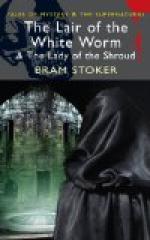“I am sorry I disturbed you. I am really not unconventional—though certainly no slave to convention. Still there are limits . . . it is bad enough to intrude in this way, and I do not know what you can say or think of the time selected, for the intrusion.”
After all, Edgar Caswall was a gentleman by custom and habit, so he rose to the occasion.
“I can only say, Lady Arabella, that you are always welcome at any time you may deign to honour my house with your presence.”
She smiled at him sweetly.
“Thank you so much. You do put one at ease. My breach of convention makes me glad rather than sorry. I feel that I can open my heart to you about anything.”
Forthwith she proceeded to tell him about Oolanga and his strange suspicions of her honesty. Caswall laughed and made her explain all the details. His final comment was enlightening.
“Let me give you a word of advice: If you have the slightest fault to find with that infernal nigger, shoot him at sight. A swelled-headed nigger, with a bee in his bonnet, is one of the worst difficulties in the world to deal with. So better make a clean job of it, and wipe him out at once!”
“But what about the law, Mr. Caswall?”
“Oh, the law doesn’t concern itself much about dead niggers. A few more or less do not matter. To my mind it’s rather a relief!”
“I’m afraid of you,” was her only comment, made with a sweet smile and in a soft voice.
“All right,” he said, “let us leave it at that. Anyhow, we shall be rid of one of them!”
“I don’t love niggers any more than you do,” she replied, “and I suppose one mustn’t be too particular where that sort of cleaning up is concerned.” Then she changed in voice and manner, and asked genially: “And now tell me, am I forgiven?”
“You are, dear lady—if there is anything to forgive.”
As he spoke, seeing that she had moved to go, he came to the door with her, and in the most natural way accompanied her downstairs. He passed through the hall with her and down the avenue. As he went back to the house, she smiled to herself.
“Well, that is all right. I don’t think the morning has been altogether thrown away.”
And she walked slowly back to Diana’s Grove.
Adam Salton followed the line of the Brow, and refreshed his memory as to the various localities. He got home to Lesser Hill just as Sir Nathaniel was beginning lunch. Mr. Salton had gone to Walsall to keep an early appointment; so he was all alone. When the meal was over—seeing in Adam’s face that he had something to speak about—he followed into the study and shut the door.
When the two men had lighted their pipes, Sir Nathaniel began.
“I have remembered an interesting fact about Diana’s Grove—there is, I have long understood, some strange mystery about that house. It may be of some interest, or it may be trivial, in such a tangled skein as we are trying to unravel.”




